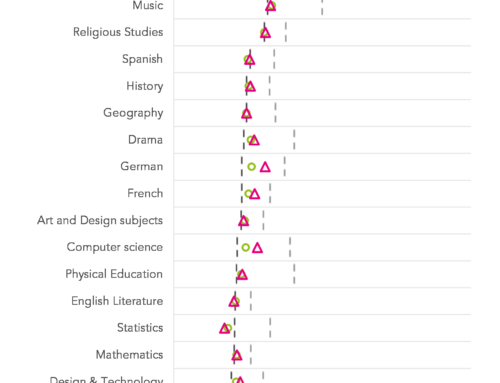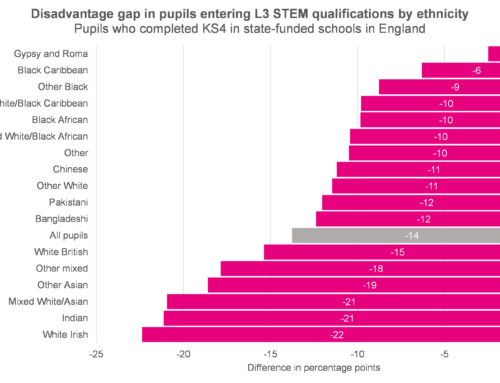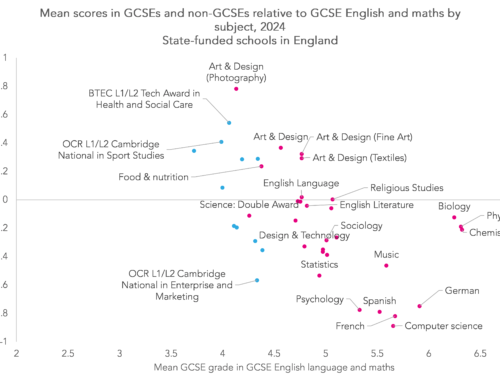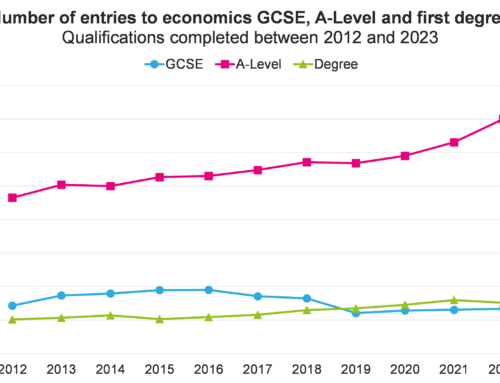Last year, we reported on entries and grades in the first set of AS-Levels to be reformed. Compared to 2015, entries fell in all subjects, ranging from 11% (business studies) to 33% (art and design).
This year, more subjects have been reformed and decoupled from A-Levels. Data published by Ofqual earlier in the summer showed that these subjects have experienced even greater falls in entrants than those seen in the subjects that decoupled a year earlier[1]. In addition, there have been further drops in entries in the subjects that were decoupled last year.
Number of entries in AS-Levels by Year 12 students by year AS-Level was reformed, England
| 2014 | 2015 | 2016 | 2017 | |
| Reformed 2015/16 | 585,200 | 581,260 | 449,330 | 223,530 |
| Reformed 2016/17 | 137,520 | 135,920 | 126,650 | 46,430 |
| Reformed 2017/18 | 194,640 | 194,280 | 187,700 | 173,780 |
(Years given here are those in which reformed subjects became available for teaching. So Reformed 2015/16 subjects are those that became available for teaching in September 2015, and in which young people would have first taken AS-Levels in 2016 and A-Levels in 2017)
As the table above shows, entries in the subjects reformed in 2016 fell by 23% (581,260 to 449,330) in their first year. Among those reformed in 2016/17, entries fell by a much greater margin: 66% (126,650 to 46,430).
Entries in subjects which will be reformed next year also declined slightly, by 7% (187,700 to 173,780). We would have expected a fall in entries – the cohort (in schools at least) is 2.5% smaller than last year – but perhaps not such a large drop. We suspect at this stage that this is related to the decline in Year 12 students starting four courses due to reforms and funding cuts.
We perhaps shouldn’t read too much into the more rapid decline of entries in the 2016/17 tranche of decoupled subjects. Schools and colleges are still clearly coming to terms with reforms. In fact, when we compare the change between entry numbers in 2015 and 2017 we see that entries in subjects reformed in 2015/16 and 2016/17 have fallen by reasonably similar amounts: 62% and 66% respectively.
Impact on attainment
JCQ publishes aggregate AS-Level results for students in England. Unfortunately, Year 12 students are not separately identified.
However, the data for all students shows that the percentage achieving grade A-B increased in 2017 apart from in the subjects which were reformed in 2015/16.
In these days of comparable outcomes, year-on-year comparisons of national results in AS-Levels (and GCSEs) tell you more about changes in the prior attainment profile of students than they do about changes in standards achieved.
The chart above seems to indicate that students entered in 2016/17 for AS-Levels that were reformed in 2015/16 had lower prior attainment than the previous cohort. For other subjects, however, entrants in 2016/17 had higher prior attainment than their predecessors.
Why still enter?
Last year, we noted that entries in business studies, psychology and sociology fell at a lower rate than other subjects reformed in 2016. At the time, JCQ attributed this to the fact that students are much less likely to have studied these subjects at GCSE[2], hence the AS-Level provided useful information to the school and student (e.g. for UCAS applications).
If that was the case then, it is less clear that it is now. Between 2015 and 2017 entries in psychology, for example, fell by 61% – exactly the same as biology.
Entries in AS-Levels reformed in 2015/16
| 2014 | 2015 | 2016 | 2017 | Change 2015 to 2017 | |
| Art & design subjects | 49,520 | 49,300 | 31,860 | 15,750 | -68% |
| Biology | 72,340 | 70,850 | 57,030 | 27,780 | -61% |
| Business studies | 35,150 | 36,260 | 30,440 | 15,350 | -58% |
| Chemistry | 61,120 | 59,840 | 48,000 | 24,310 | -59% |
| Computing | 8,780 | 10,210 | 9,150 | 5,390 | -47% |
| Economics | 31,210 | 33,000 | 26,630 | 13,400 | -59% |
| English | 100,870 | 95,290 | 69,880 | 32,540 | -66% |
| History | 61,160 | 59,030 | 42,030 | 20,900 | -65% |
| Physics | 45,360 | 45,120 | 36,390 | 18,790 | -58% |
| Psychology | 79,080 | 79,520 | 61,960 | 30,760 | -61% |
| Sociology | 40,610 | 42,840 | 35,960 | 18,560 | -57% |
By next year, almost all subjects will have been reformed and some (such as General Studies) will no longer be available. We will then have more of a handle on whether the end is nigh for AS-Levels.
Want to receive other results day blogposts by email? Sign up to our mailing list to get notifications about new blogposts, or to receive our half-termly newsletter
1. Ofqual entry data has been used, as it was available of results day. Unlike the JCQ data, it also allows us to look specifically at Year 12 students’ entries.
2. For example, only 7% of students entered for A-Level sociology in 2016 had a GCSE in it. This compares to 95% in history.







Leave A Comment